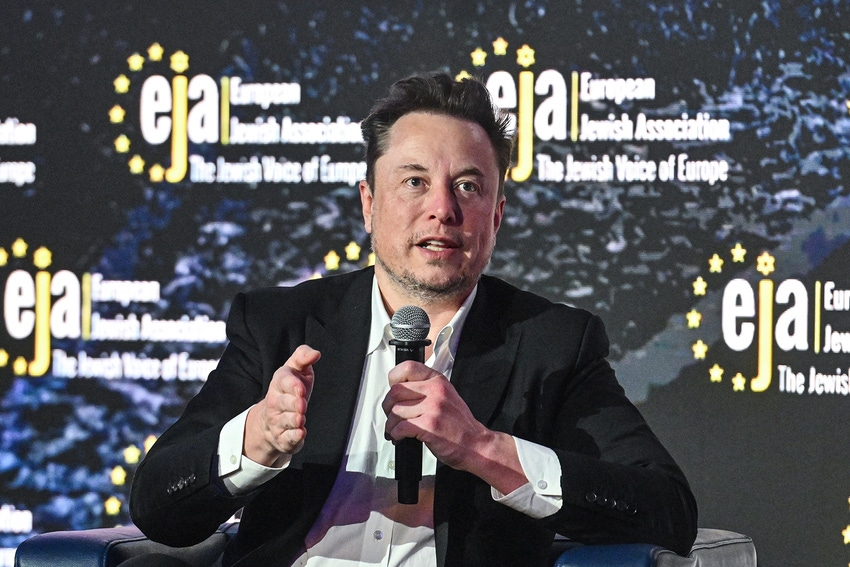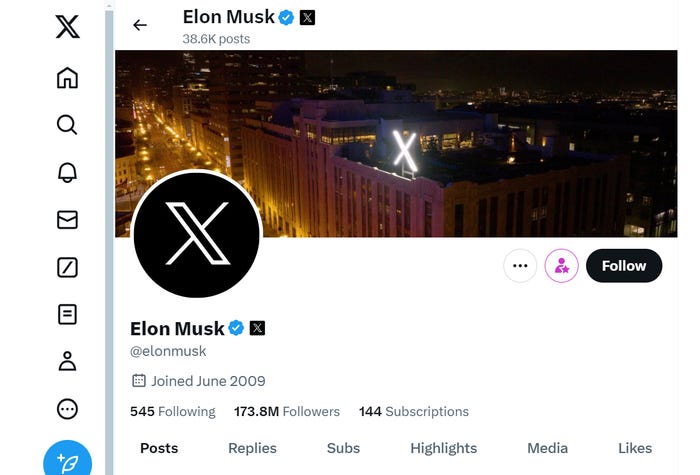The Musk Conundrum: Assessing the Impact of Elon Musk's Role at Tesla
Market analyst Christoph Liu on the complex relationship between Tesla Inc. and CEO Elon Musk, benefits and drawbacks of Musk's continued leadership, and the ‘X’ factor.

At a Glance
- Tesla has benefitted from the company's strong identification in the public's mind with its CEO, Elon Musk.
- That strong identification has potential downsides, argues analyst Christoph Liu.
- How the CEO's behavior in the news and on social media remains, literally, an 'X' factor.
Christoph Liu, a stock market analyst, recently delved into the intricate relationship between Tesla, Inc. and its CEO, Elon Musk. In his Seeking Alpha article, “Tesla Needs Elon Musk More Than He Needs It: Why That Is Problematic,” Liu argues that Tesla's valuation is strongly influenced by Musk's larger-than-life personality—but it’s a two-edged sword for the company.
Liu emphasizes Musk's multi-faceted portfolio, which includes companies like SpaceX, Neuralink, and X AI, posing a potential conflict of interest for Tesla shareholders. He points out that Tesla's valuation, especially in the field of artificial intelligence, relies heavily on Musk's reputation, raising concerns about the company becoming just a customer to X AI, Musk's dedicated AI company.
The analyst speculates on the impact of Musk's potential exit from Tesla, identifying it as a significant catalyst that could lead to a reevaluation of the company as a car manufacturer rather than a technology company. Despite acknowledging the low probability of Musk leaving, Liu discusses the potential consequences and challenges Tesla might face without Musk at the helm.
But what interested this reader most was Liu’s discussion of the pros and cons of Musk’s relationship with Tesla.
Pros and cons
On the ‘pro’ side: Liu acknowledges Elon Musk's visionary leadership as a driving force behind Tesla's elevated valuation. Musk's involvement in various ventures, including SpaceX, Neuralink, and X AI, adds an innovative edge to Tesla. The anticipation of Tesla's leadership in artificial intelligence, fueled by Musk's brilliance, is a significant pro for shareholders.
Also, Musk's larger-than-life personality and public persona contribute to Tesla's marketing efforts. Despite concerns about divided attention, Liu concedes that Musk's activities benefit Tesla in terms of brand recognition. The "Musk Factor" has played a crucial role in elevating Tesla beyond a conventional car company.

Tesla CEO Elon Musk at a 2022 Semi delivery event. Image courtesy of Tesla
And finally, Musk's charismatic leadership style has garnered a dedicated following and has been a key driver of Tesla's valuation. His public image is intertwined with the Tesla brand, creating a unique selling proposition that differentiates the company from traditional automakers.
But there are cons as well: Liu highlights the potential conflicts of interest arising from Musk's involvement in multiple companies, especially those related to artificial intelligence. The risk of Tesla becoming a customer rather than a leader in AI, given Musk's roles in other AI-focused ventures, poses a concern for shareholders, Liu notes.
Along with that, Liu points out that while Musk's other ventures contribute to Tesla's marketing, whether he can afford Tesla the necessary attention while being preoccupied with projects like SpaceX is an open question.
And then there’s the question of whether the recent Delaware Court ruling limiting Musk's control and ownership stake in Tesla. The potential cancellation or replacement of Musk's compensation package and his inability to reach a 25 percent ownership stake may hinder Musk's influence over strategic decisions.
Those concerns, among others, are why Liu thinks the valuation of Tesla’s stock is currently too high.
The elephant in the room
Remembering that Liu is a market analyst writing for other market followers, I was nonetheless surprised by what that list of cons about Musk’s leadership didn’t include. The unmentioned elephant in the room is the Tesla CEO’s extreme behavior as seen on ‘X’ (Twitter) and covered widely in the news.
Just a few examples: Fortune: “Elon Musk just agreed with an explicitly antisemitic post on X amid a huge rise in hate speech on the service.” CNN: “Elon Musk is going down a conspiratorial rabbit hole and taking X with him.” The Hill: “Musk tells companies pulling ads from X: ‘Go f— yourself’.” Wall Street Journal: “Elon Musk Has Used Illegal Drugs, Worrying Leaders at Tesla and SpaceX.” There are many, many more examples.

Elon Musk's homepage on X. Screenshot by author
So, my question for analyst Christoph Liu is, "aren’t Tesla investors wary of how Musk's increasingly erratic behavior on X can impact the Tesla brand? Shouldn’t they be?"
The analyst responds
In an email exchange with this writer, Liu was kind enough to respond in some detail.
“I believe that Elon Musk's behavior at X/Twitter in particular (both his way of running the company and his private use of the service) indeed creates a risk of alienating potential customers of Tesla,” he writes.
“In a previous article I alluded particularly to a certain correlation between ecologically conscious consumers, which are naturally more likely to buy EVs, and more liberally leaning stances on political and social issues. Investors should, in my opinion, be aware of that risk factor.
On the other hand, he noted: “In fairness, the actual sales numbers so far do not indicate that this is a massive problem. I would, however, caveat that this might, in large part, be due to a lack of alternatives and could change in the future if and once there are qualitatively comparable EVs from other manufacturers.”
With regard to existing Tesla investors, he writes, “My best guess is that they do not have that many concerns about Elon Musk's erratic behavior. Some shareholders probably tend to agree with Elon Musk on a political level, others are agnostic. There is the obvious caveat, that anybody who has strong enough misgivings would possibly not buy this particular stock in the first place.
“So, I would phrase a one-sentence answer like this: I advise that investors should at least take these considerations into account—but I doubt that a majority of tesla bulls would listen to my advice on the matter.”
The question of what behavior by Elon Musk, if any, would change Tesla investors' bullishness is an open one.
About the Author(s)
You May Also Like




